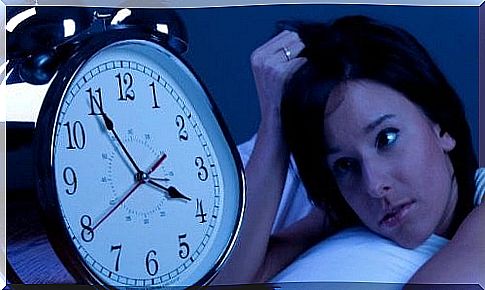Waking Up In The Middle Of The Night

The phenomenon of waking up in the middle of the night is really common. It is far from being a mysterious or supernatural event. It is actually a very common problem which is related to anxiety.
But it is a phenomenon that needs to be explained in more detail in order to be better understood and addressed. Waking up at these times early in the morning and not being able to fall asleep again can become a very serious problem if it keeps happening over a few days. Therefore, it is important to know how to handle waking up in the middle of the night properly.
To wake up in the middle of the night. Associated symptoms

There are many publications on this common phenomenon. However, we must remember that there is no strange bed it. It is actually the brain’s response to an elevated level of anxiety that we are currently experiencing. When it starts to constantly ruin our sleep, it needs to be dealt with.
It is important to keep in mind the symptoms that often occur when you wake up between 6 p.m. 3:00 and 4:00:
- Wake up to intense anxiety and restlessness.
- Palpitations and a sense of danger.
- It is impossible to fall asleep again. This increases nervousness, negative thoughts and insomnia.
- If you manage to fall asleep again, it is very easy and you wake up with a feeling of being tired.
- If you repeatedly wake up between 3 and 4 a few times a week.
Anxiety and waking up in the early morning hours
Why do I always have to wake up at 3 in the morning?
If during the week you suddenly wake up in the early morning hours, and almost always at this time. Then the first thing you need to ask yourself is: Are you worried about something, if something is bothering you, if you are working too much, or if you are facing an emotional problem.
All of these factors can cause anxiety that we may not always be aware of and the way the brain responds to these problems is through sleep. We begin to have trouble falling asleep, and when we do, anxiety causes us to wake up with a sense of threat.
Let’s take a closer look at it:
- Anxiety changes the central nervous system (CNS), which begins to show small changes in the bio- and neurochemical systems involved in the sleep-wake cycle. This directly alters all stages of sleep (REM and non-REM).
- Usually we go to bed and have a hard time falling asleep. We end up falling asleep around midnight, but anxiety causes our sleep to be shattered and it is harder to reach the REM stage, where sleep is deep and rebuilding. Our brain interprets this anxiety as a threat and something that we need to get away from. The feeling of this warning causes us to wake up violently after just a few hours around noon. 3 in the morning.
- This is our body’s natural response to anxiety and our neurotransmitters change, causing changes in our sleep.
Waking up in the middle of the night: What can we do about this problem?

If the cause of sleep disorders is anxiety, we need to confront these sources of stress and the problems that cause anxiety if we want a good night’s sleep.
- It is important to recognize that something is going on. Waking up in the middle of the night with a sense of dread or threats is a sure sign that something is wrong. Ask yourself why it is happening, what is happening in your life that is bothering you, making you unhappy and why you are feeling threatened.
- Make small changes in your life, prioritize things, and try to get new habits to stimulate your brain and get stress out.
- Try to go for a walk after dinner for at least half an hour. Go, take a deep breath, put things in perspective. Relax
- When you get home, take a relaxing bath and go to bed. The last thing you need to think about is, “I need to sleep well all night to get through the day tomorrow.” This way of thinking causes stress in your brain because it sees it as a requirement: “I have to sleep.”
- Clear your mind, calm your thoughts.
- Make sure your room is clean and well ventilated and smells fresh. According to experts, the best temperature to sleep in is 20 ° C. Once the temperature has reached 25 °, it is hard for the body to feel comfortable. Always remember this!









